Unit 2 I'll help to clean up the city parks Section A Grammar Focus-4c 课件(共33张PPT)
文档属性
| 名称 | Unit 2 I'll help to clean up the city parks Section A Grammar Focus-4c 课件(共33张PPT) | 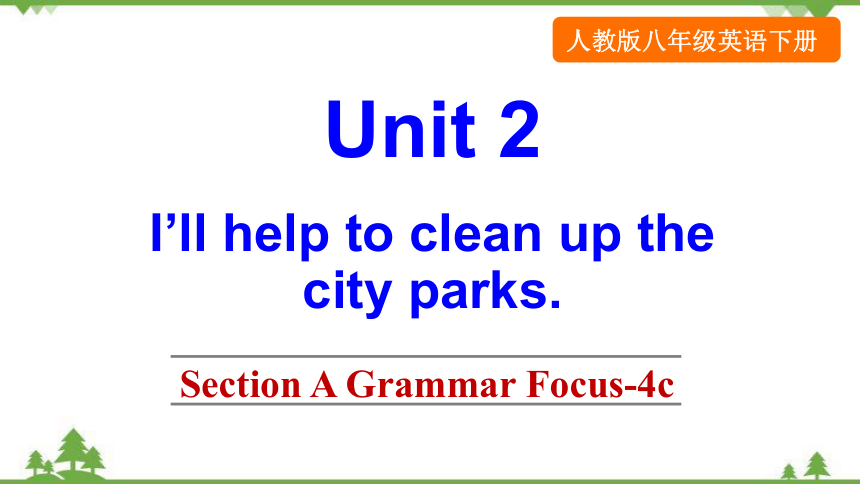 | |
| 格式 | ppt | ||
| 文件大小 | 255.5KB | ||
| 资源类型 | 教案 | ||
| 版本资源 | 人教新目标(Go for it)版 | ||
| 科目 | 英语 | ||
| 更新时间 | 2022-06-06 12:55:07 | ||
图片预览

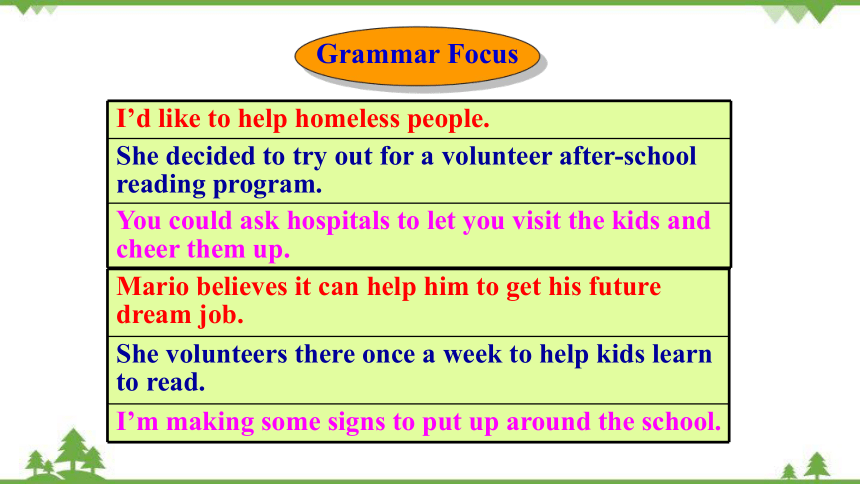
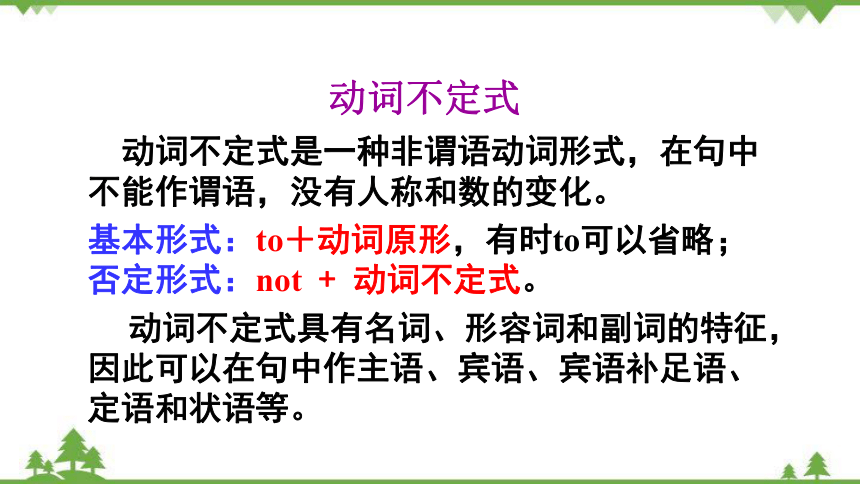
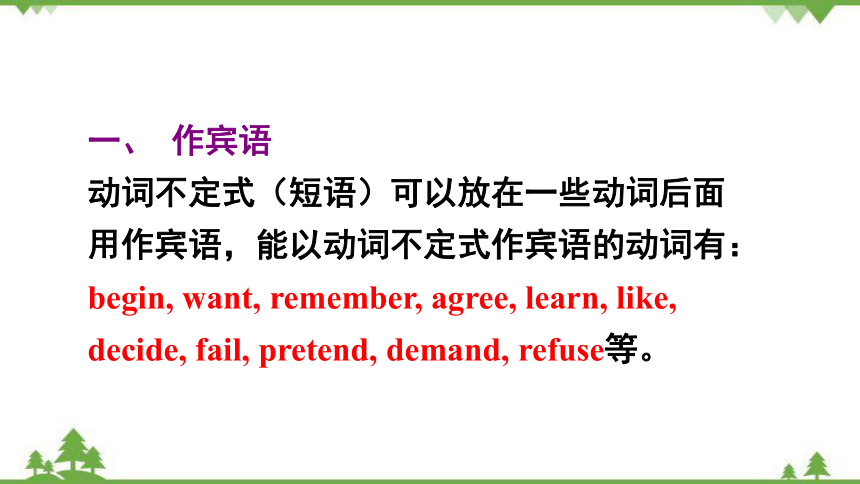
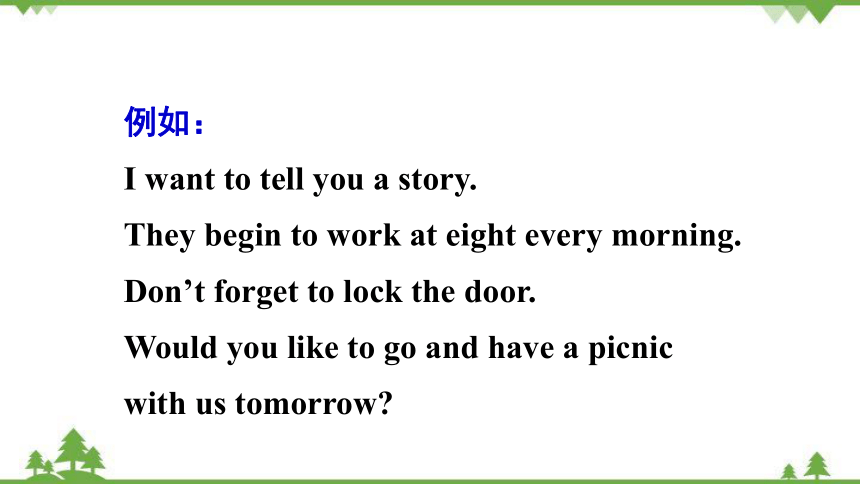
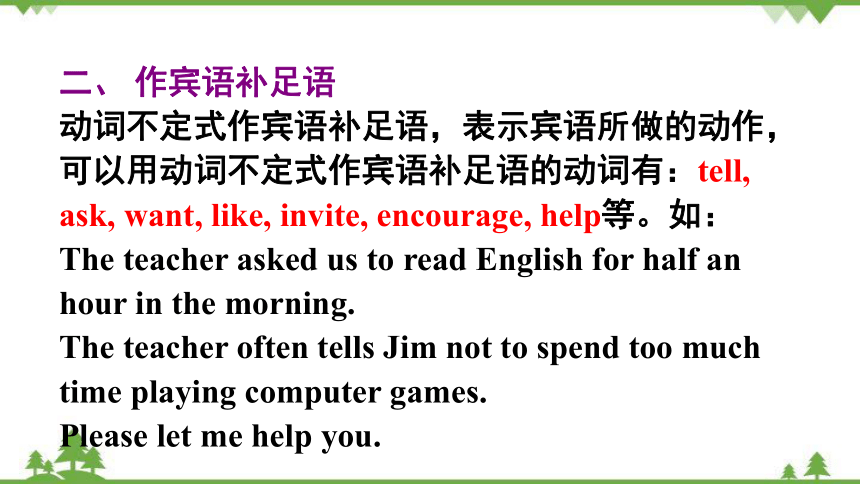
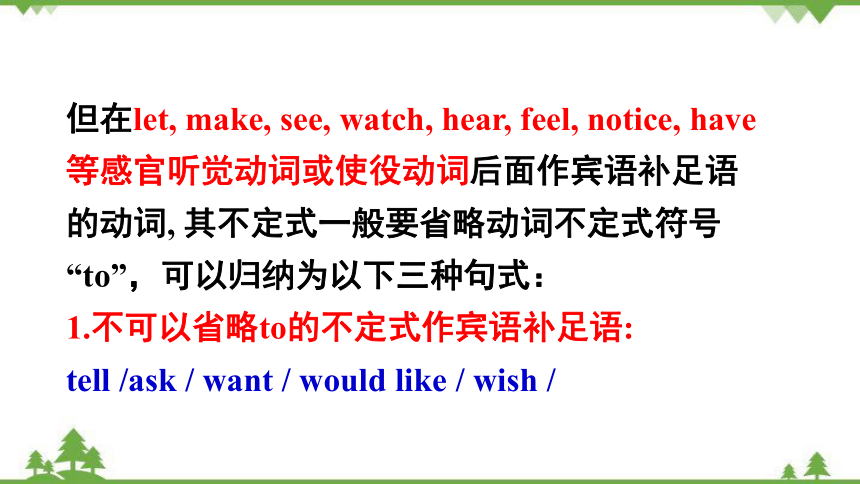

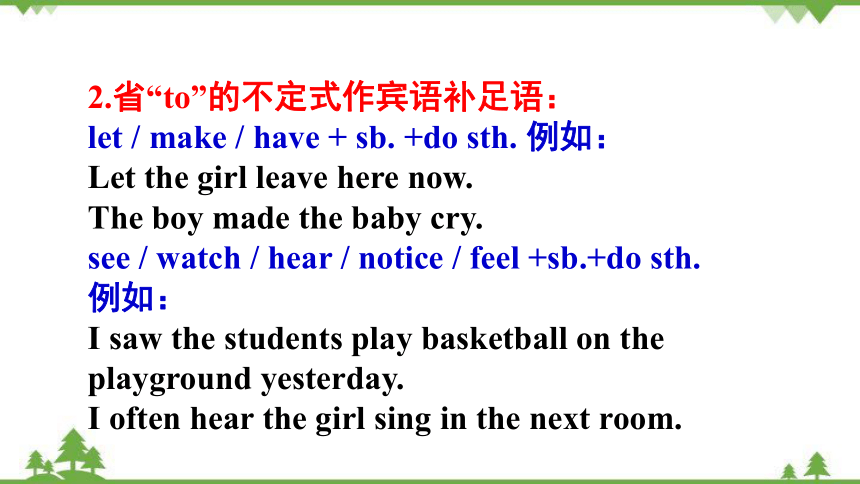
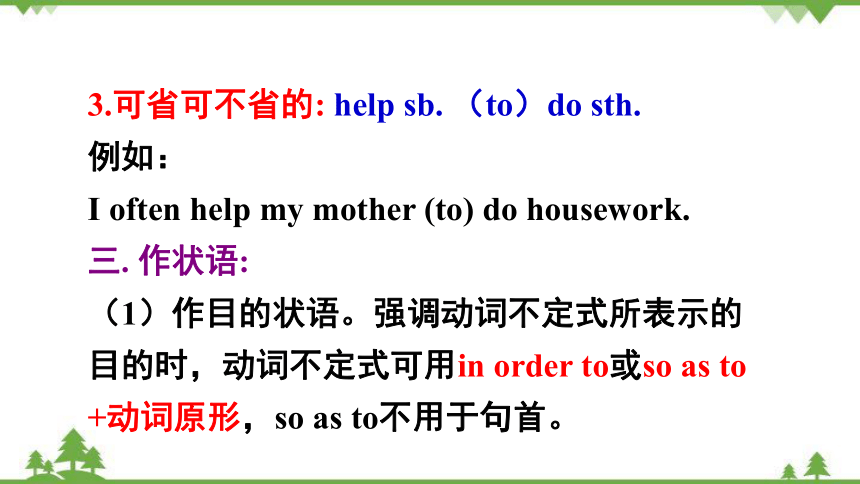
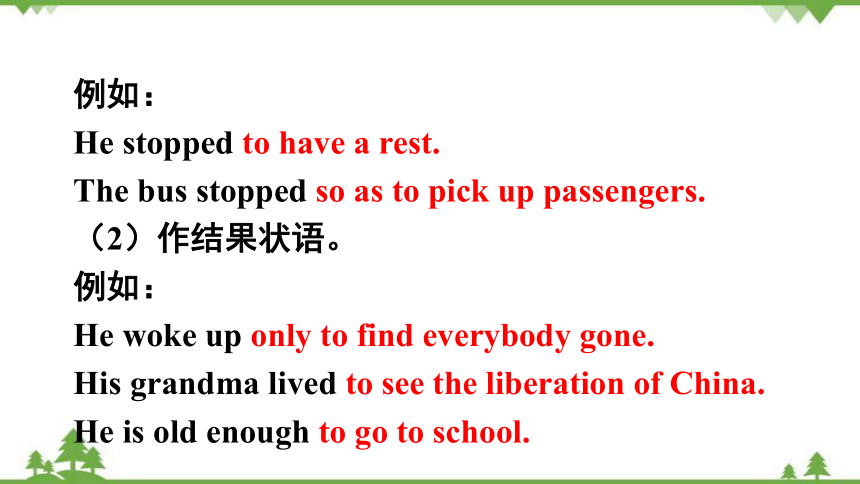
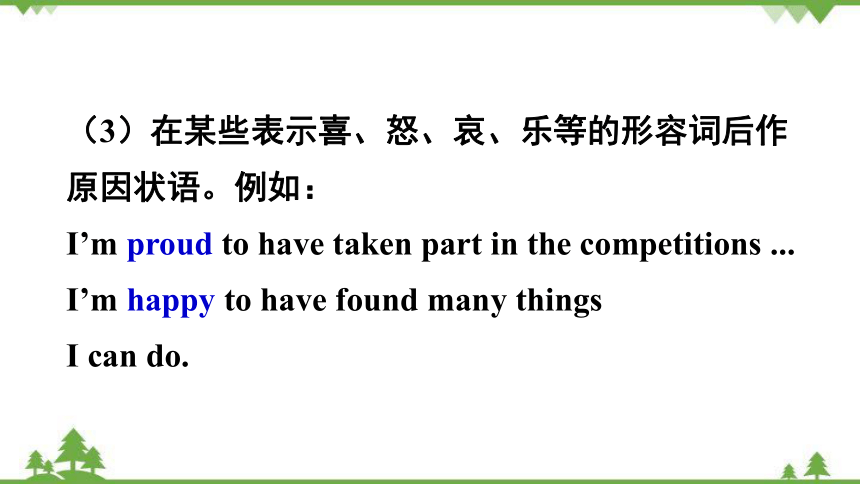
文档简介
(共33张PPT)
Unit 2
I’ll help to clean up the city parks.
人教版八年级英语下册
Section A Grammar Focus-4c
I’d like to help homeless people.
She decided to try out for a volunteer after-school reading program.
You could ask hospitals to let you visit the kids and cheer them up.
Grammar Focus
Mario believes it can help him to get his future dream job.
She volunteers there once a week to help kids learn to read.
I’m making some signs to put up around the school.
动词不定式
动词不定式是一种非谓语动词形式,在句中不能作谓语,没有人称和数的变化。
基本形式:to+动词原形,有时to可以省略;否定形式:not + 动词不定式。
动词不定式具有名词、形容词和副词的特征,因此可以在句中作主语、宾语、宾语补足语、定语和状语等。
一、 作宾语 动词不定式(短语)可以放在一些动词后面
用作宾语,能以动词不定式作宾语的动词有:
begin, want, remember, agree, learn, like, decide, fail, pretend, demand, refuse等。
例如:
I want to tell you a story.
They begin to work at eight every morning.
Don’t forget to lock the door.
Would you like to go and have a picnic with us tomorrow
二、 作宾语补足语
动词不定式作宾语补足语,表示宾语所做的动作,可以用动词不定式作宾语补足语的动词有:tell, ask, want, like, invite, encourage, help等。如:
The teacher asked us to read English for half an hour in the morning.
The teacher often tells Jim not to spend too much time playing computer games.
Please let me help you.
但在let, make, see, watch, hear, feel, notice, have等感官听觉动词或使役动词后面作宾语补足语的动词, 其不定式一般要省略动词不定式符号“to”,可以归纳为以下三种句式:
1.不可以省略to的不定式作宾语补足语: tell /ask / want / would like / wish /
suppose / invite /encourage /teach/ depend on等 + sb.+ to do sth.
例如:
The teacher told us to come earlier.
I want you to go now.
Her parents wish her to be a teacher.
2.省“to”的不定式作宾语补足语:
let / make / have + sb. +do sth. 例如:
Let the girl leave here now.
The boy made the baby cry.
see / watch / hear / notice / feel +sb.+do sth.
例如:
I saw the students play basketball on the playground yesterday.
I often hear the girl sing in the next room.
3.可省可不省的: help sb. (to)do sth.
例如:
I often help my mother (to) do housework.
三. 作状语:
(1)作目的状语。强调动词不定式所表示的目的时,动词不定式可用in order to或so as to +动词原形,so as to不用于句首。
例如:
He stopped to have a rest.
The bus stopped so as to pick up passengers.
(2)作结果状语。
例如:
He woke up only to find everybody gone.
His grandma lived to see the liberation of China.
He is old enough to go to school.
(3)在某些表示喜、怒、哀、乐等的形容词后作原因状语。例如:
I’m proud to have taken part in the competitions ...
I’m happy to have found many things
I can do.
(1)动词不定式的否定式是直接在to之前加not. 如:
Tell them not to play football in the street.
(2)省略to的动词不定式的否定式是直接在动词前面加not. 如:
Let the boy not go.
动词不定式的否定形式:
1. I want to _______ my plan to work in an
animal hospital until next summer. I’m too
busy with my studies this year.
2. She hopes to ________ at least five primary
schools to ask if they need volunteers for
their after-school programs.
put up hand out call up cheer up
come up with give out put off
put off
call up
4a
Fill in the blanks with phrasal verbs in the box.
3. Our class is trying to ______________ some
ideas to __________ sick children because they
are often sad.
4. We decided to _________ signs around the
school and __________ notices to tell students
about the book sale. We will _________ the
money from the sale to homeless people.
come up with
cheer up
put up
hand out
give out
help move do make visit spend
Most people today are only worried about getting good jobs _________ lots of money. In their free time, they think about what _______ for fun. However, few people think about what they can do ________ others. There are many people who are less lucky than us. Volunteering
to do
to help
to make
Fill in the blanks with the correct forms of the verbs in the box.
4b
our time to help these people is a good way __________ our free time. For example, we can make plans _________ sick children in the
hospital or raise money for homeless people. Some people even stop doing their jobs for a few months to a year __________ to another place, like one of the countries in Africa, and help people there.
to spend
to visit
to move
Complete the sentences with your own ideas. Use infinitives.
I’d like to volunteer ____________________________________.
At 12:00 a.m., I called my friend _______________________________________.
at the food bank to help the poor
to play basketball at the playground
4c
3. I’m very busy but I could help
____________________________________.
4. Summer vacation is coming, and I want
____________________________________.
5. I want to travel alone, but my parents told
me (not)_____________________________.
to look after my little sister.
to go to the beach with my friends
not to do it alone
1) I’d like ________ homeless people.
2) She decided __________ for a volunteer after-school reading program.
3) You could ask hospitals ______ you visit the kids and cheer them up.
I. 填空。
to help
to try out
to let
Exercises
4) Mario believes it can help him ________ his
future dream job.
5) She volunteers there once a week ________ kids learn _________.
6) I’m making some signs ___________ around the school.
to get
to help
to read
to put up
I want __________ (become) a policeman one day.
2. He wants the students _______ (eat) well.
3. The teacher made his students _______ (come) into the meeting room on time.
4. The boy was free ______ (go) where he liked.
5. Nobody tells him what _______ (do) next.
II. 根据提示完成下列句子。
to become
to eat
come
to go
to do
III. 根据汉语提示补全句子。
1. 你愿意帮忙打扫城市公园吗?
Would you like ___ ____ _____ ____ the city parks
2. 莉莉,你能帮我洗碗吗?
Could you please help me ___ ______ the dishes, Lily
3. 简没有想出解决这道数学题的好方法。
Jane didn’t _____ ___ ____ a good way ___ _____
____ this math problem.
to help clean up
come up with
out
to work
to wash
4. 他们正计划去拉萨旅行。
They’re _________ __ ____ a trip to Lhasa.
5. 我们应该努力学习,将来为我们的祖国做贡献。
We should study hard __ ______ a major
commitment for our country in the future.
planning to take
to make
IV. 根据汉语提示完成下列句子。
We must find a person ___________________
(做这项工作)
2. In my family, my mother is always the first one ____________ (起床).
3. Do you have ______________________ (什么问题要问)?
4. Please tell me _______________________
(怎样念这个词).
to do the work
to get up
any questions to ask
how to say this word
I always tell my students ____ on the road
because it’s really dangerous.
A. not to play B. to play not
C. not playing D. not play
2. — I will go to Harbin for my summer vacation.
What about you
— I haven’t decided where ____.
A. go B. went C. going D. to go
V.单项选择。
3. — I didn’t hear you come in just now.
— That’s good. We tried ___ any noise, for
you were sleeping.
A. not make B. not to make
C. to make D. making
4. Lucy is shy. She would not invite her classmates
____ dancing with her.
A. practice B. practices
C. practicing D. to practice
(2019·益阳)
_________, he has to listen to tapes every day.
A. To learn English well
B. Learn English well
C. Learning English well
缺少解析
中考链接
A
(2019·湖南)
She will ________ the silk dress and wear it.
A. put away B. put up C. put on
【解析】句意“她将收拾好丝质衣服并且穿上它”。A.收拾好;B.张贴、搭建、举起、留宿;C.穿上(表示动作)。根据句意可知,表示“将衣服收好”。故选A。
A
(2019·辽宁)
My cousin volunteers in the Children’s Home. His job is to food and clothes.
A. sell out B. work out
C. hand out D. find out
【解析】句意:我表哥在“儿童之家”当义工。他的工作是分发食物和衣服。考查动词短语辨析。A. 卖光;B. 想出;C. 发放;D. 发现。根据My cousin volunteers in the Children’s Home.可知hand out food and clothes符合句意,故选C。
C
(2019·四川)
We’d better __________ our sports meeting because it’s going to rain.
A. put on B. put up C. put off
【解析】句意:我们最好把我们的运动会 ______,因为天要下雨了。A. put on 穿上,上演;B. put up 举起,张贴;C. put off 推迟。根据后面的天要下雨,可知最好推迟运动会,故选C。
C
Review the grammar points we learn today. Find more exercise to practice.
Homework
Unit 2
I’ll help to clean up the city parks.
人教版八年级英语下册
Section A Grammar Focus-4c
I’d like to help homeless people.
She decided to try out for a volunteer after-school reading program.
You could ask hospitals to let you visit the kids and cheer them up.
Grammar Focus
Mario believes it can help him to get his future dream job.
She volunteers there once a week to help kids learn to read.
I’m making some signs to put up around the school.
动词不定式
动词不定式是一种非谓语动词形式,在句中不能作谓语,没有人称和数的变化。
基本形式:to+动词原形,有时to可以省略;否定形式:not + 动词不定式。
动词不定式具有名词、形容词和副词的特征,因此可以在句中作主语、宾语、宾语补足语、定语和状语等。
一、 作宾语 动词不定式(短语)可以放在一些动词后面
用作宾语,能以动词不定式作宾语的动词有:
begin, want, remember, agree, learn, like, decide, fail, pretend, demand, refuse等。
例如:
I want to tell you a story.
They begin to work at eight every morning.
Don’t forget to lock the door.
Would you like to go and have a picnic with us tomorrow
二、 作宾语补足语
动词不定式作宾语补足语,表示宾语所做的动作,可以用动词不定式作宾语补足语的动词有:tell, ask, want, like, invite, encourage, help等。如:
The teacher asked us to read English for half an hour in the morning.
The teacher often tells Jim not to spend too much time playing computer games.
Please let me help you.
但在let, make, see, watch, hear, feel, notice, have等感官听觉动词或使役动词后面作宾语补足语的动词, 其不定式一般要省略动词不定式符号“to”,可以归纳为以下三种句式:
1.不可以省略to的不定式作宾语补足语: tell /ask / want / would like / wish /
suppose / invite /encourage /teach/ depend on等 + sb.+ to do sth.
例如:
The teacher told us to come earlier.
I want you to go now.
Her parents wish her to be a teacher.
2.省“to”的不定式作宾语补足语:
let / make / have + sb. +do sth. 例如:
Let the girl leave here now.
The boy made the baby cry.
see / watch / hear / notice / feel +sb.+do sth.
例如:
I saw the students play basketball on the playground yesterday.
I often hear the girl sing in the next room.
3.可省可不省的: help sb. (to)do sth.
例如:
I often help my mother (to) do housework.
三. 作状语:
(1)作目的状语。强调动词不定式所表示的目的时,动词不定式可用in order to或so as to +动词原形,so as to不用于句首。
例如:
He stopped to have a rest.
The bus stopped so as to pick up passengers.
(2)作结果状语。
例如:
He woke up only to find everybody gone.
His grandma lived to see the liberation of China.
He is old enough to go to school.
(3)在某些表示喜、怒、哀、乐等的形容词后作原因状语。例如:
I’m proud to have taken part in the competitions ...
I’m happy to have found many things
I can do.
(1)动词不定式的否定式是直接在to之前加not. 如:
Tell them not to play football in the street.
(2)省略to的动词不定式的否定式是直接在动词前面加not. 如:
Let the boy not go.
动词不定式的否定形式:
1. I want to _______ my plan to work in an
animal hospital until next summer. I’m too
busy with my studies this year.
2. She hopes to ________ at least five primary
schools to ask if they need volunteers for
their after-school programs.
put up hand out call up cheer up
come up with give out put off
put off
call up
4a
Fill in the blanks with phrasal verbs in the box.
3. Our class is trying to ______________ some
ideas to __________ sick children because they
are often sad.
4. We decided to _________ signs around the
school and __________ notices to tell students
about the book sale. We will _________ the
money from the sale to homeless people.
come up with
cheer up
put up
hand out
give out
help move do make visit spend
Most people today are only worried about getting good jobs _________ lots of money. In their free time, they think about what _______ for fun. However, few people think about what they can do ________ others. There are many people who are less lucky than us. Volunteering
to do
to help
to make
Fill in the blanks with the correct forms of the verbs in the box.
4b
our time to help these people is a good way __________ our free time. For example, we can make plans _________ sick children in the
hospital or raise money for homeless people. Some people even stop doing their jobs for a few months to a year __________ to another place, like one of the countries in Africa, and help people there.
to spend
to visit
to move
Complete the sentences with your own ideas. Use infinitives.
I’d like to volunteer ____________________________________.
At 12:00 a.m., I called my friend _______________________________________.
at the food bank to help the poor
to play basketball at the playground
4c
3. I’m very busy but I could help
____________________________________.
4. Summer vacation is coming, and I want
____________________________________.
5. I want to travel alone, but my parents told
me (not)_____________________________.
to look after my little sister.
to go to the beach with my friends
not to do it alone
1) I’d like ________ homeless people.
2) She decided __________ for a volunteer after-school reading program.
3) You could ask hospitals ______ you visit the kids and cheer them up.
I. 填空。
to help
to try out
to let
Exercises
4) Mario believes it can help him ________ his
future dream job.
5) She volunteers there once a week ________ kids learn _________.
6) I’m making some signs ___________ around the school.
to get
to help
to read
to put up
I want __________ (become) a policeman one day.
2. He wants the students _______ (eat) well.
3. The teacher made his students _______ (come) into the meeting room on time.
4. The boy was free ______ (go) where he liked.
5. Nobody tells him what _______ (do) next.
II. 根据提示完成下列句子。
to become
to eat
come
to go
to do
III. 根据汉语提示补全句子。
1. 你愿意帮忙打扫城市公园吗?
Would you like ___ ____ _____ ____ the city parks
2. 莉莉,你能帮我洗碗吗?
Could you please help me ___ ______ the dishes, Lily
3. 简没有想出解决这道数学题的好方法。
Jane didn’t _____ ___ ____ a good way ___ _____
____ this math problem.
to help clean up
come up with
out
to work
to wash
4. 他们正计划去拉萨旅行。
They’re _________ __ ____ a trip to Lhasa.
5. 我们应该努力学习,将来为我们的祖国做贡献。
We should study hard __ ______ a major
commitment for our country in the future.
planning to take
to make
IV. 根据汉语提示完成下列句子。
We must find a person ___________________
(做这项工作)
2. In my family, my mother is always the first one ____________ (起床).
3. Do you have ______________________ (什么问题要问)?
4. Please tell me _______________________
(怎样念这个词).
to do the work
to get up
any questions to ask
how to say this word
I always tell my students ____ on the road
because it’s really dangerous.
A. not to play B. to play not
C. not playing D. not play
2. — I will go to Harbin for my summer vacation.
What about you
— I haven’t decided where ____.
A. go B. went C. going D. to go
V.单项选择。
3. — I didn’t hear you come in just now.
— That’s good. We tried ___ any noise, for
you were sleeping.
A. not make B. not to make
C. to make D. making
4. Lucy is shy. She would not invite her classmates
____ dancing with her.
A. practice B. practices
C. practicing D. to practice
(2019·益阳)
_________, he has to listen to tapes every day.
A. To learn English well
B. Learn English well
C. Learning English well
缺少解析
中考链接
A
(2019·湖南)
She will ________ the silk dress and wear it.
A. put away B. put up C. put on
【解析】句意“她将收拾好丝质衣服并且穿上它”。A.收拾好;B.张贴、搭建、举起、留宿;C.穿上(表示动作)。根据句意可知,表示“将衣服收好”。故选A。
A
(2019·辽宁)
My cousin volunteers in the Children’s Home. His job is to food and clothes.
A. sell out B. work out
C. hand out D. find out
【解析】句意:我表哥在“儿童之家”当义工。他的工作是分发食物和衣服。考查动词短语辨析。A. 卖光;B. 想出;C. 发放;D. 发现。根据My cousin volunteers in the Children’s Home.可知hand out food and clothes符合句意,故选C。
C
(2019·四川)
We’d better __________ our sports meeting because it’s going to rain.
A. put on B. put up C. put off
【解析】句意:我们最好把我们的运动会 ______,因为天要下雨了。A. put on 穿上,上演;B. put up 举起,张贴;C. put off 推迟。根据后面的天要下雨,可知最好推迟运动会,故选C。
C
Review the grammar points we learn today. Find more exercise to practice.
Homework
同课章节目录
- Unit 1 What's the matter?
- Section A
- Section B
- Unit 2 I'll help to clean up the city parks.
- Section A
- Section B
- Unit 3 Could you please clean your room?
- Section A
- Section B
- Unit 4 Why don't you talk to your parents?
- Section A
- Section B
- Unit 5 What were you doing when the rainstorm came
- Section A
- Section B
- Review of Units 1-5
- Unit 6 An old man tried to move the mountains.
- Section A
- Section B
- Unit 7 What's the highest mountain in the world?
- Section A
- Section B
- Unit 8 Have you read Treasure Island yet?
- Section A
- Section B
- Unit 9 Have you ever been to a museum?
- Section A
- Section B
- Unit 10 I've had this bike for three years.
- Section A
- Section B
